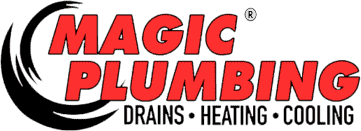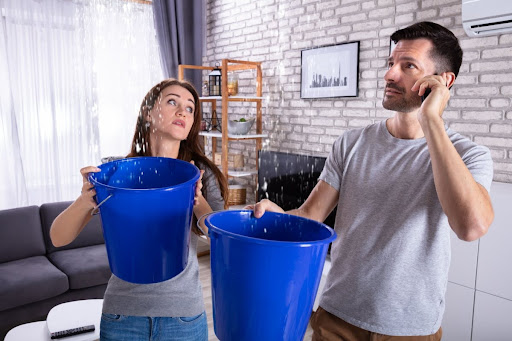Water leaks can be a homeowner’s worst nightmare, causing damage to the structure of homes and potentially leading to high repair costs. Understanding the different types of water leaks is essential in taking proactive steps to prevent damage and ensure the longevity of your home’s plumbing infrastructure.
In this blog, we’ll explore five common types of water leaks, offering insights into detecting them and emphasizing the importance of regular maintenance and professional leak detection services.
1. Toilet Leaks
One of the most common types of water leaks in houses stems from the toilet. These leaks can occur in several areas, including the base of the toilet, the water supply line, or even internally, from the tank to the bowl. Toilet leaks not only waste water but can also lead to significant increases in your water bill if left unchecked. Regular checks for water around the toilet base and listening for running water can help detect these leaks early.
2. Leaking Pipes
Pipes, hidden within walls and floors, can develop leaks due to various reasons, such as corrosion, high water pressure, or freezing temperatures. Leaking pipes can cause moisture damage to drywall, paint, and even the structural integrity of your home. Early signs include unexplained water puddles, mold growth, or a musty smell. These leaks require immediate attention to prevent further damage.
3. Slab Leaks
Though not as common, slab leaks are serious and occur in the plumbing lines running below the concrete foundation of your house. Symptoms of slab leaks include the sound of running water when all water is turned off, a sudden spike in your water bill, or warm spots on your floor. Due to their location, slab leaks are challenging to detect and can cause significant damage to your home’s foundation.
4. Irrigation System Leaks
Outdoor leaks in your irrigation system can go unnoticed for long periods, leading to wasted water and potential damage to your landscaping. Signs of an irrigation leak include soggy patches in your yard, uneven plant growth, or a surprising increase in your water bill. Regularly inspecting your sprinkler heads and irrigation lines for signs of leaks is crucial.
5. Water Heater Leaks
Leaks from your hot water tank can range from minor drips to significant leaks, potentially leading to water damage and mold growth. Regularly inspecting your water heater for signs of moisture, corrosion, or water pooling at the base can help catch leaks early. Remember, water heater leaks can also impact your hot water supply, making early detection vital.
Detecting Water Leaks
Detecting leaks early on is crucial in preventing potential health hazards and structural damage to your home. Use these strategies to stay ahead:
- Regular Maintenance: Conduct regular inspections of your plumbing systems, including pipes, toilets, and water heaters, to identify any signs of wear or damage.
- Monitor Water Pressure: High water pressure can lead to pipe damage. Installing a pressure regulator can help maintain safe levels.
- Professional Leak Detection: For hidden leaks or if you suspect a leak but cannot find the source, consider hiring a professional plumber. They have the tools and expertise to accurately locate plumbing leaks without causing further damage to your property.
Strategies for Leak Prevention
While knowing how to detect leaks is crucial for mitigating water damage, ideally, the goal is to prevent leaks from happening in the first place. Here are strategies you can employ to shield your home against water leakage.
Understand Your Plumbing System
A fundamental step in preventing leaks is understanding the layout of your plumbing system. Knowing the location of main water lines, shut-off valves, and how your system operates can be invaluable in quickly addressing issues before they escalate.
Use Water-Sensing Alarms
Technology offers innovative solutions, such as water-sensing alarms, which can detect the presence of unwanted water and alert you early to potential leaks. Placing these sensors near water heaters, under sinks, and washing machines can offer peace of mind and early detection.
Replace Old Pipes and Fixtures
Materials degrade over time, including those in your plumbing system. Regularly assess the condition of your pipes, faucets, and fixtures. Replacing old or corroded parts can prevent leaks from occurring, ensuring your system remains efficient and reliable.
Regular Professional Inspections
Even with the best preventive measures, some plumbing leaks can be elusive or originate from areas beyond your expertise. Scheduling regular inspections with a professional plumber can uncover hidden issues, ensuring your system is in optimal condition.
The Role of Professional Plumbers
Addressing plumbing leaks often requires the expertise of a professional plumber. They can provide emergency repairs, offer solutions for common plumbing leaks, and ensure your plumbing system functions optimally. Professional services are essential not just for fixing current leaks but for implementing measures to prevent future leaks.
Contact Us Today for Expert Leak Detection!
Awareness and proactive management of the types of water leaks discussed can save homeowners time, money, and stress. While some leaks are easily noticeable, others require more vigilance and, occasionally, the expertise of professional plumbers. Regular inspections and maintenance of your plumbing system are key in detecting leaks early and preventing significant damage.
For those experiencing leaks or suspecting their presence, Magic Plumbing offers comprehensive leak detection and repair services. Our water leak detection plumbers are equipped to handle everything from minor drips to major leaks, ensuring your home remains safe and dry. Don’t let leaks dampen your peace of mind. Schedule your leak detection service today and protect your home from the hidden dangers of water leaks!
If you need plumbing services in San Francisco, CA, or the surrounding area, we’re only a quick call away. Let’s safeguard your home against the unpredictable nature of water leaks together!


